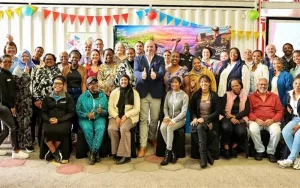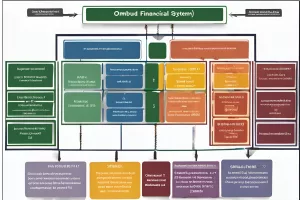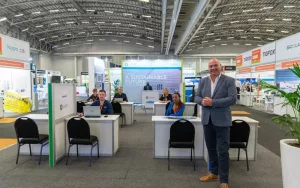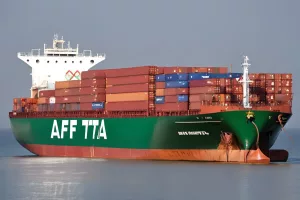Showmax and Multichoice are standing firm in their decision to broadcast the controversial docuseries ‘Tracking Thabo Bester’ despite legal pressure from the couple featured in the series. The series chronicles Bester’s daring exploits, including his jailbreak from prison, and raises debates surrounding personal rights and journalistic ethics. Showmax and Multichoice argue that they have taken all necessary steps to ensure the documentary aligns with journalistic integrity and ethical reporting, and uphold the public’s right to watch and form their own opinions.
The City of Cape Town’s Local Tourism Forum focuses on women in the tourism industry, highlighting their valuable contributions and advocating for increased representation in leadership roles. The forum challenges gender stereotypes and sets a benchmark for creating a more equitable, inclusive, and sustainable industry. The city’s commitment towards responsible tourism aligns with its dedication to gender parity, and it serves as an excellent example for other cities to follow. Although the path towards complete equality is lengthy, Cape Town’s initiative shows that the ultimate goal is within reach.
Zululand’s economic progress is facing challenges due to crime, which threatens the stability of the business sector and the safety of citizens. President Cyril Ramaphosa and his administration engaged in a dialogue with Durban’s business community to tackle these issues and lay the groundwork for the KwaZuluNatal (KZN) economy’s expansion. SAPS has made considerable progress in combating criminal organizations and individuals despite budgetary restrictions, and the business sector, civil society, and law enforcement need to work together to create a safe business environment. However, the government remains devoted to ensuring that police continue their work across the region to improve law enforcement in identified areas.
The Granger Bay precinct at the V&A Waterfront in Cape Town is set to undergo a R20 billion development project over the next two decades. The project, which includes a mixeduse development, public walkway, and watersports bay, aims to reestablish public access to the oceanfront and promote outdoor activities. The development is expected to boost the Western Cape’s economy by 2% and create approximately 28,000 jobs, pending approval from the City of Cape Town.
South Africa is facing an economic crisis, with population growth surpassing economic development and leading to a ‘percapita recession’. However, a socioeconomic partnership between public and private entities is yielding positive results. The private sector has offered vital financial and intellectual support to the government, with the aim of elevating South Africa’s economic growth rate by 6% and promoting inclusive economic development. This partnership serves as an example of collective resilience and ingenuity, embodying the African philosophy of Ubuntu and potentially inspiring other nations dealing with their distinct issues.
South Africa’s financial ombud system is undergoing major reforms with the launch of the National Financial Ombud Scheme and the Retirement Funds Ombud. The changes are based on recommendations from a World Bank diagnostic study and aim to enhance consumer safeguards and promote better results within the financial services industry. The reforms will require legislative amendments and the National Financial Ombud Scheme is expected to start operations on March 1, 2024, leading to a promising future for South Africa’s financial sector.
The Africa Energy Indaba is a conference that focuses on the energy sector in Africa. It allows small businesses and entrepreneurs to showcase their green energy solutions, meet potential investors and financiers, participate in industry discussions, and network within the energy ecosystem. The 2024 conference in Cape Town showcased eight innovative businesses, each with their unique emphasis on green solutions. These enterprises are paving the way for a cleaner, greener future in Africa and beyond.
The African Continental Free Trade Area (AfCFTA) is an agreement that aims to unify the African market and boost economic development. South Africa is playing a key role in promoting PanAfricanism and global solidarity through its involvement in various international economic development organizations. With the implementation of AfCFTA, South Africa is exploring new trade opportunities with Asia and the Middle East, as well as promoting infrastructure expansion and industrial progression. The country is leading the way in implementing AfCFTA and is committed to achieving economic unification and prosperity across the African continent.
The cannabis and hemp sectors in South Africa have enormous potential for economic growth and prosperity. However, smallscale businesses face significant challenges in securing financial aid and competing against large corporations. The Portfolio Committee on Small Business Development and SAHPRA are working to implement measures to create a favorable environment for smallscale cultivators to thrive. With collective effort, the cannabis and hemp sectors can make a substantial contribution to South Africa’s economy, and it’s important for citizens to advocate for change.
The Dawn of Sustainability: Global Aid Fuels Urban Solar and Eco-friendly Initiatives
One city is leading the way towards a more ecoconscious future with the help of global aid. The city is receiving technical support valued at over R4 million, which will aid its energy initiatives and create opportunities for knowledge sharing. The city is committed to sustainability strategies and has introduced innovative initiatives, such as the Power Heroes program, to promote sustainable resource management. With ongoing backing from international organizations, the city’s future looks bright indeed.
The Free State Investment Conference invited business tycoons to explore the many investment opportunities the province has to offer. Deputy Minister Nomalungelo Gina encouraged investors to take advantage of the province’s economic potential and emphasized the government’s commitment to revitalizing the economy. She highlighted the importance of attracting foreign direct investment and supporting local industrial parks while promoting inclusivity and Black Industrialists. The conference served as a strategic initiative to jumpstart the province’s economic engine and breathe new life into sectors in decline.
South Africa is making significant progress in its energy transition, with a focus on addressing issues such as climate change, energy security, and energy poverty. The Integrated Resource Plan (IRP) outlines a diverse energy portfolio aimed at catering to the country’s escalating power demands while drastically cutting down carbon emissions. South Africa is making efforts to overcome obstacles, such as limited grid capacity, the inconsistent nature of renewable energy, and outdated infrastructure. The ultimate goal is to ensure that “we leave no one behind,” and South Africa’s experience can serve as an example for other African nations.
The *South African Energy Investment Forum* is a critical platform for stakeholders to address energy deprivation, stimulate investment, and reduce carbon emissions. The government’s strategy includes the *Integrated Resource Plan (IRP)* to *increase energy capacity, eliminate transmission capacity limitations, and encourage embedded generation*. *Nuclear and gas* are expected to play a vital role in South Africa’s energy transition, with a *focus on engaging communities and encouraging investments* to ensure effective information dissemination and active community involvement in the industry. Overall, the forum serves as a beacon of hope for a sustainable and prosperous future in the energy sector.
South Africa is investing over R21 billion to upgrade its airports, including Johannesburg, Cape Town, and regional airports like Gqeberha’s Chief Dawid Stuurman International Airport, George Airport, Durban’s King Shaka International Airport, and East London’s King Phalo Airport. The plan aims to boost tourism, stimulate international trade, and position South Africa as a prominent figure in global aviation. These investments signify the nation’s ambitions to enhance its global status, stimulate economic growth, and establish itself as an influential player in global aviation, creating job opportunities and stimulating economic growth.
Get ready to witness exceptional wealth growth in Cape Town, Bengaluru, Sharjah, Jeddah, and Riyadh. These cities are emerging as hidden gems of economic prosperity and are projected to challenge the traditional wealth hierarchy. With a compelling mix of robust economies, business opportunities, and strategic locations, these cities are poised to propel themselves to the forefront of global economic attention in the coming decade. Their impressive wealth growth stories highlight the shifting paradigms of global wealth distribution and their rise to prominence is worth watching.
Barrydale Hand Weavers is an artisanal weaving brand located in Barrydale, South Africa, that uses locally sourced cotton scraps to create ecofriendly fashion. Their collaboration with Uni Form’s creative head, Luke Radloff, has propelled them to the world’s foremost fashion stage Paris Fashion Week 2024. The brand serves as a shining beacon of global textile production and offers a sustainable source of income for over 30 families. Their story serves as a motivational reminder of the power of passion, craftsmanship, and steadfast dedication to sustainable practices.
















